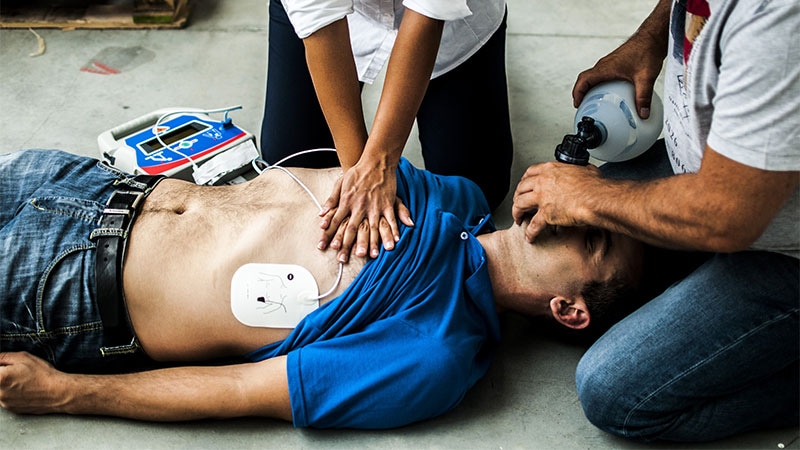Core Concepts
Stress-related disorders and anxiety significantly increase the risk of out-of-hospital cardiac arrest.
Abstract
The study suggests that stress-related disorders and anxiety are linked to a higher risk of out-of-hospital cardiac arrest (OHCA). The findings were based on a case-control study comparing over 35,000 OHCA case patients with matched control persons. The study highlights the importance of early risk monitoring for OHCA in patients with stress-related disorders and anxiety. The research was published in BMJ's Open Heart.
- Stress Disorders and Anxiety Overrepresented
- Stress and anxiety are associated with a higher risk of OHCA.
- PTSD was linked to a twofold higher risk of OHCA.
- Data Extraction
- Long-term stress conditions overall had a hazard ratio of 1.44 for OHCA.
- PTSD had a hazard ratio of 1.80 for OHCA.
- Behavioral and Psychosocial Factors
- Unhealthy lifestyle behaviors may increase the risk of OHCA.
- Lack of data on lifestyle factors in the study.
- Detrimental to the Heart
- Negative psychological stress factors increase the risk of cardiac events.
- Stress and anxiety are not only detrimental to psychological health but also increase the risk of cardiac arrest.
Customize Summary
Rewrite with AI
Generate Citations
Translate Source
To Another Language
Generate MindMap
from source content
Visit Source
www.medscape.com
PTSD, Anxiety Linked to Out-of-Hospital Cardiac Arrest
Stats
Long-term stress conditions overall had a hazard ratio of 1.44 for OHCA.
PTSD had a hazard ratio of 1.80 for OHCA.
Quotes
"Negative psychological stress factors, such as stress and anxiety, are not only detrimental to one's psychological health but likely increase one's risk for adverse cardiac events, such as cardiac arrest." - Glenn Levine, MD
Key Insights Distilled From
by Batya Swift ... at www.medscape.com 05-30-2023
https://www.medscape.com/viewarticle/992535
Deeper Inquiries
How can healthcare providers better screen and support patients with stress-related disorders and anxiety to prevent OHCA?
Healthcare providers can implement several strategies to improve the screening and support for patients with stress-related disorders and anxiety to prevent out-of-hospital cardiac arrest (OHCA). Firstly, routine screening for stress-related disorders and anxiety during primary care visits can help identify at-risk individuals early on. This can involve the use of standardized questionnaires or assessments to gauge the level of stress and anxiety in patients. Additionally, healthcare providers should be trained to recognize the signs and symptoms of these conditions and initiate appropriate interventions.
Supporting patients with stress-related disorders and anxiety can involve a multidisciplinary approach. Collaborating with mental health professionals such as psychologists or psychiatrists can provide patients with access to specialized care and treatment options. Cognitive-behavioral therapy, stress management techniques, and relaxation exercises can be beneficial in managing stress and anxiety. Furthermore, promoting healthy lifestyle behaviors such as regular exercise, balanced diet, and sufficient sleep can also help reduce the risk of OHCA in these patients.
What are the potential implications of these findings on public health policies and interventions?
The findings of the study linking stress-related disorders and anxiety to a higher risk of OHCA have significant implications for public health policies and interventions. Public health policies may need to prioritize mental health screening and support programs to address the burden of stress-related disorders and anxiety on cardiovascular health. Integrating mental health services into primary care settings and promoting awareness about the link between psychological stress and cardiac events can help reduce the incidence of OHCA.
Interventions aimed at reducing stress and anxiety in the general population can have far-reaching benefits for cardiovascular health outcomes. Public health campaigns promoting stress management techniques, mindfulness practices, and mental health education can empower individuals to take proactive steps in managing their psychological well-being. Additionally, workplace wellness programs and community-based initiatives focused on mental health promotion can contribute to a healthier population and potentially lower the incidence of OHCA.
How can individuals proactively address stress and anxiety to reduce their risk of cardiac events?
Individuals can take proactive steps to address stress and anxiety in order to reduce their risk of cardiac events such as OHCA. Firstly, practicing stress management techniques such as deep breathing exercises, meditation, yoga, or mindfulness can help regulate the body's stress response and promote relaxation. Engaging in regular physical activity, maintaining a healthy diet, and getting an adequate amount of sleep are also essential in managing stress and anxiety.
Building a strong support network of friends, family, or mental health professionals can provide individuals with the necessary resources to cope with stress and anxiety effectively. Seeking therapy or counseling to address underlying issues contributing to psychological distress can be beneficial in reducing the risk of cardiac events. Additionally, avoiding unhealthy coping mechanisms such as excessive alcohol consumption, smoking, or substance abuse is crucial in maintaining cardiovascular health. By taking a proactive approach to mental well-being, individuals can significantly lower their risk of experiencing cardiac events associated with stress-related disorders and anxiety.
0
